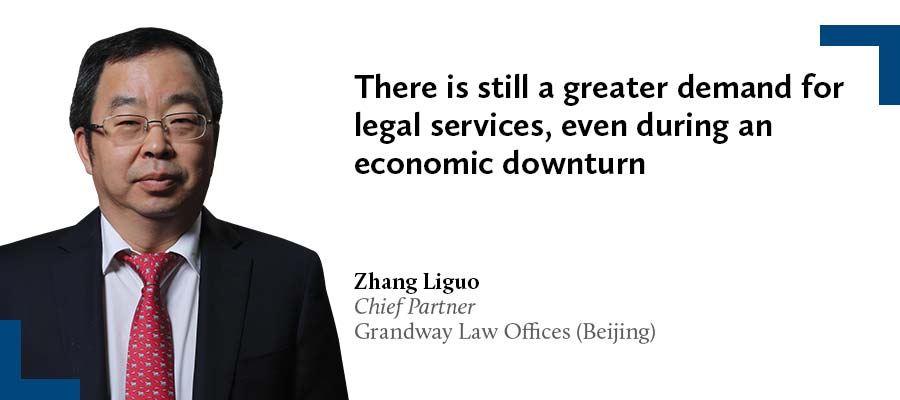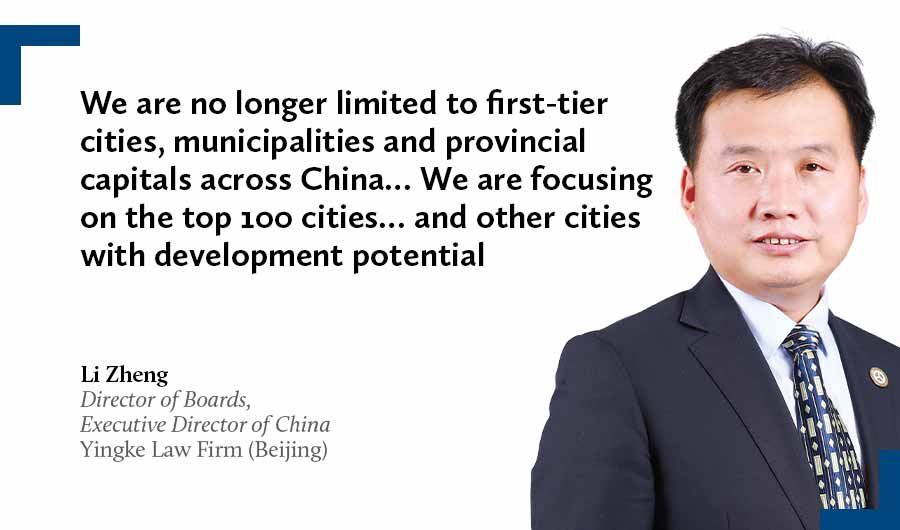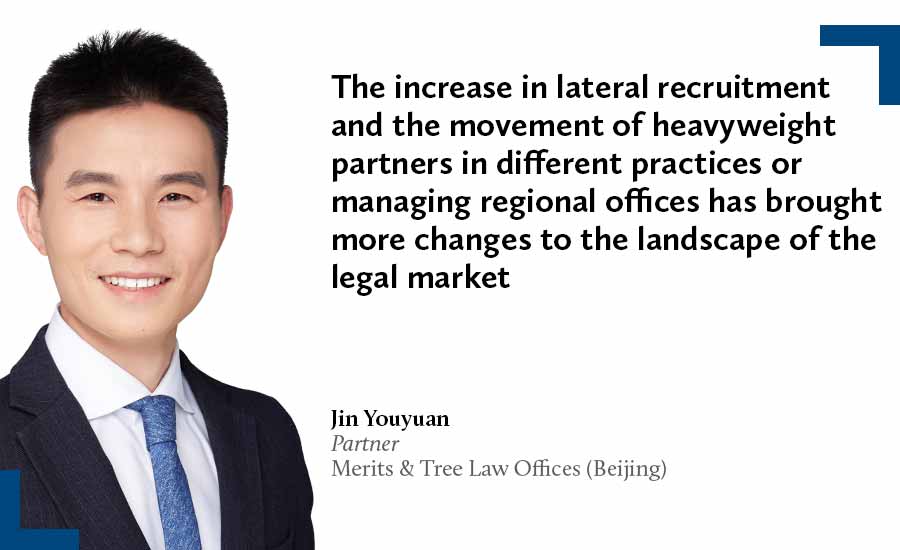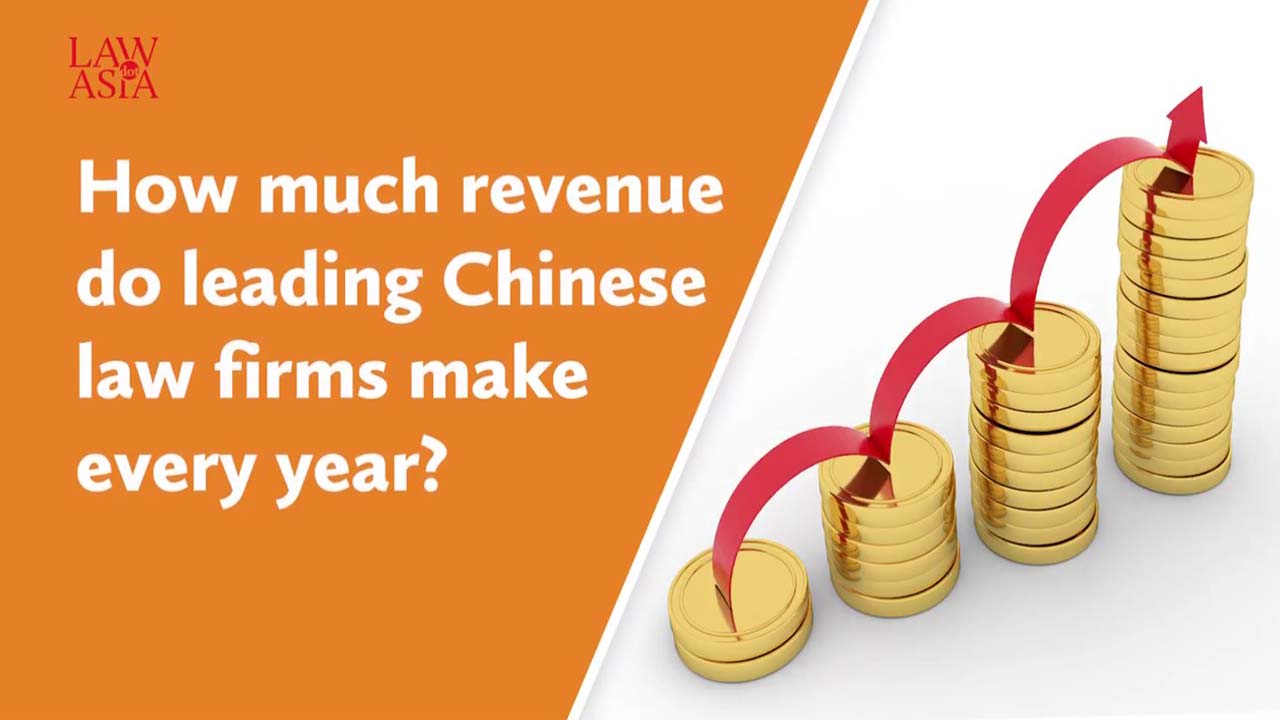China’s leading law firms are beginning to see an acceleration in revenue growth, but new strategies are required for a transforming domestic economy. China Business Law Journal conducted its annual legal market survey for 2021 with 94 leading law firms to seek their views on trends of the past year. Winny Zhang reports
Within an old text known as the Huainanzi are these words: “Truly, blessing turns to disaster, and disaster to blessing: the changes have no end, nor can the mystery be fathomed.” There are many such proverbs in ancient Chinese writings, many as pertinent today as when they were written.
As the legal industry knows too well, and as our annual survey for 2021 reveals, opportunities are to be found as the pendulum has swung into darker times and innovation has found a way to grow new business while keeping older operations ticking over.
With government support via spending in crucial areas, and growth in predictable practice areas during times of turmoil, most law firms are reporting revenue growth. Grasping new innovations has led to quickly adopting new ways of doing business and law firms are looking west to capture strategic markets. Truly, blessings are to be clearly seen.
The median revenue of 66 law firms that disclosed their financial performances in 2021 was RMB223 million (USD31.56 million), an 8.6% increase year-on-year. The median annual growth rate, on the other hand, was 21.3%, closer to the 24% recorded in 2019.
“There is still a greater demand for legal services, even during an economic downturn,” says Zhang Liguo, a chief partner at Grandway Law Offices based in Beijing.

In the first quarter of 2021, domestic economic growth surged to 18.3%, and the overall performance in the first half was encouraging. However, following stronger headwinds in August including power restrictions, flooding in Henan and Shanxi provinces, and sporadic covid outbreaks, fourth quarter GDP in 2021 grew by just 4%, the lowest since the second quarter of 2020 at 3.2%.
Although the economic downturn should have led to a reduction in business in various sectors, at this time “the government is investing more in infrastructure, medicine and big data management, so there may be some new opportunities for legal services in these areas,” says Wang Yongjing, a Shenzhen-based senior partner at SD & Partners.
More than half of the firms surveyed had revenue growth of between 0% and 40% last year, with just 3.1% suffering a decrease in revenue.
Don’t put all your eggs in one basket is a philosophy that the pandemic has forced law firms to adopt. Zhang says that even though his firm has witnessed the ups and downs of China’s capital market over the past 28 years, he still has to push forward with diversification. “It’s a move that not only satisfies clients for their needs of a full range of legal services, but further strengthens the firm’s resilience to risk,” he says.
Of all law firms that disclosed financial data, 15.9% have exceeded RMB1 billion in revenue last year, up from 12.7% in 2020.
Firms that posted annual revenue in 2021 of “less than RMB200 million” (41.3%), and “RMB200-400 million” (31.7%), were the two largest groups according to the survey, with the former in 2020 at 48.1%, while the latter was 20.3%.
CRISIS FUELS INNOVATION
Shanghai implemented a city-wide lockdown in April and May this year due to the highly contagious nature of the omicron strain, which the International Monetary Fund noted in a recent report has caused “a worse than anticipated slowdown in China”.
Zhang says: “It is evident that this year different industries have encountered unprecedented difficulties due to domestic and external economic fluctuations, geopolitical relations and covid-19, as evidenced by the feedback from those leading companies. Law firms’ businesses have been affected to some extent as a result.”
One law firm, Landing Law Offices, even had to relax the deadline for the payment of legal fees at one point to ride out the storm with their clients.
While the going is still tough, the surveyed firms were, overall, confident in the development of China’s legal market – 30.8% of respondents had a “very optimistic” outlook, down from 55% last year. Most respondents tended to be “neutral” (11.5%) and “optimistic” (57.7%), while in 2020 merely 2.2% of respondents were neutral and 40.7% were optimistic. However, no firms chose “very pessimistic” or “pessimistic” this year.
But, as always in the legal sector, negative factors also bring opportunities. “The demand for corporate services still focuses on the labour sector, such as handling of personnel issues and the calculation of working hours under the impact of the pandemic; and with the impact of the pandemic on the market and economic activities, corporate restructuring and transformation are emerging as new business growth areas,” says Steven Zhou, a senior partner at the Shanghai headquarters of Hui Ye Law Firm.
Even foreign clients have the same aspirations, according to CMS China’s Shanghai-based managing partner, Ulrike Glueck. “Many companies are looking for ways to cut costs and implement synergies,” she says. “Clients want to know what corporate restructuring measures can be adopted, especially by foreign investors and foreign-invested enterprises in China, and which is the most suitable one.”
The erratic health crisis-associated production cut-off has prompted companies and plants to ask for rent relief on the grounds of force majeure. However, Wei Lai, managing partner at City Development Law Firm in Shanghai, points out that this ground is not applicable in all cases and has given rise to many disputes in this area.

According to Jin Mao Law Firm, opportunities and challenges always go hand in hand. The firm’s Shanghai partners Donald Liu, Maximilian Han and Wan Bo caution that frequent outbreaks have spawned innovation and stimulated the internet industry alongside a healthcare development represented by vaccines, nucleic acids and pandemic prevention, while it is also creating legal issues in areas such as cybersecurity and personal information protection.
STRATEGIC EXPANSIONS
As the legal market becomes more competitive, leading firms now tend to be more precisely positioned than in the previous two years. “We are no longer limited to first-tier cities, municipalities and provincial capitals across China,” notes Li Zheng, a Beijing-based director of boards and executive director of China at Yingke Law Firm. “We are focusing on the top 100 cities in China in terms of GDP, and other cities with development potential.”
One of the trends of regional expansion is towards the midwest. Due to the unique political and economic environment and cultural heritage of the midwest, some firms have chosen to open up their presence there by merging with local firms.
In April this year, Grandall Law Firm forayed into Yinchuan via a merger with local city firm Ningxia Xingye Law Firm, making the new office its 35th branch and signalling Grandall’s presence across central, eastern and western China. The firm has about 130 lawyers under the leadership of its founding partner and lifetime honorary director, Zu Guizhou, who has been acting as president of the Ningxia Lawyers Association for two consecutive terms. Zu is also a legal adviser to the Party Committee of the Ningxia Hui Autonomous Region and the Autonomous Region Government.
Around the same period, Gansu Sheng Fang Zhou Law Firm merged with China Commercial Law Firm to form a Lanzhou branch. This is China Commercial’s second foray into northwest China after opening an office in Xi’an. Gansu Sheng Fang Zhou was the first law firm in Gansu province to operate as a co-operative under a Ministry of Justice pilot scheme.

East & Concord Partners also set up a new branch in Xi’an at the end of 2021 to develop significant opportunities, as the midwest is a vital urban node on the Belt and Road Initiative (BRI).
“In recent years, tensions between China and the US or China and Europe have led to cross-border service reduction, but there will be more investment and environmental business on the BRI,” says Wang. His firm plans to shift the focus of its foreign-related services to countries along the BRI zone.
In our survey, about 30% of foreign-related business came from countries along the BRI route. The top five most-mentioned countries for outbound legal services were: Singapore (11); Thailand (6); India (5); Indonesia (5); and Vietnam (5). In terms of inbound services, the countries were: Singapore (15); Malaysia (7); India (6); Thailand (5); and Indonesia (4).
Wang notes that BRI-oriented clients are concerned about how to ensure protection from the local judicial system once their capital leaves China, but neglect to maximise the benefits by way of interaction between PRC and foreign laws.
“[Some clients are] over-reliant on foreign law firms and ignore the overall co-ordinating position of PRC law firms in the process,” says Wang. “After all, the BRI policy is led by the Chinese side.”
The most popular region for foreign-related business, however, remains the US, followed by Japan, Hong Kong and Singapore.
As a bridge between home and abroad, Hong Kong enjoys opportunities from both sides; some Chinese companies listed in the US have switched to the Hong Kong capital market due to the uncertainty of China-US relations, while the Greater Bay Area (GBA) policy is pulling together the legal markets of Hong Kong and the mainland.
Hong Kong lawyers have regularly been approved to practise in the GBA since July. The authorities of Qianhai, a special economic pilot in Shenzhen, announced in May that maximum support of RMB2 million would be given to law firms affiliated with Guangdong, Hong Kong and Macau as well as being stationed in Qianhai.
To embrace this trend, JunHe involved its Hong Kong office in the South China strategy this year, planning together with its offices in Guangzhou, Shenzhen and Haikou.
“As the country continues to deepen its reforms and welfare policies in South China, the demand for legal services across this region, including the GBA, will see a further boost,” says Yu Yongqiang, a Beijing-based partner at JunHe. “The demand for cross-border legal services generated by this area will surely grow accordingly.”
Grandway Law Offices intends to establish a Haikou office this year to serve South China along with its Shenzhen and Hong Kong branches, while the Hong Kong office of Merits & Tree Law Offices is expected to be completed within the year.
COMPETITION FOR TALENT
Law firms post-pandemic are not all on the defensive; talent recruitment remains methodical, but not at the same pace. The survey shows that the total number of lawyers at firms grew by 9.7%, however, equity partners were drawing another picture, with average growth of 22%.
The total number of lawyers refers to qualified persons who can legally practise at a firm, including equity partners and their increase reflects changes in the size of firms.
“In view of the uncertain global economic situation, we have mainly adopted internal promotions without plans for large-scale expansion,” says David Tian, managing partner of An Tian Zhang & Partners in Beijing.
In our 2020 survey, the proportion of partners promoted internally (53%) and hired laterally (47%) was almost half and half, but the gap widened in 2021, with 62.7% of lawyers now entering the partnership by way of internal promotion.
But law firms are still thirsty for talent and such battles in 2022 are focused on leading partners.
Xu Guojian, a former managing partner at Boss & Young Attorneys at Law, has joined SGLA Law Firm’s Shanghai office as a senior partner along with his team. He had been appointed by the State Council several times as a delegate in negotiations at the diplomatic session of the Hague Conference of Private International Law.
Leon Liu, a co-founder of Yuanda China Law Firm in Shanghai, has moved to JunHe, handling government enforcement and cross-border regulatory compliance. Intellectual property specialist Gordon Gao brought his colleagues from Fangda Partners to join the Beijing office of King & Wood Mallesons, where he is a partner.
Three of five members of Grandway’s management committee have joined Merits & Tree, along with dozens of partners and associates, enlarging the firm’s capital markets department to more than 20 partners and 100 legal professionals, as well as further expanding its scope of practice.
The battle for talent has also spread to overseas branches, with former Law Society of Hong Kong president Thomas So joining Grandall as a partner from Mayer Brown, Edward Liu, who was awarded the Medal of Honour by the Hong Kong government, joining Haiwen & Partners as a Hong Kong-based partner.
“The increase in lateral recruitment and the movement of heavyweight partners in different practices or managing regional offices has brought more changes to the landscape of the legal market,” notes Jin Youyuan, a director of the management committee at Merits & Tree in Beijing. “Integrated firms may have more strong suits to lure talent, and thus to rapidly upgrade their overall competitiveness of operations and professionals.”
In 2021, law firm practitioner income rose at an overall consistent rate. The median revenue of per equity partner increased by 6.8% year on year to just over RMB5 million, and per associate rose by 5.9% to just over RMB1 million.
“We believe the environmental impact is fair to all,” says Jin. “Business is plentiful and [legal talent] is in short supply amid an economic upturn, and although law firms put little effort and cost into operations, each partner can make a good profit. But when the economy goes down, namely the market is contracting and competition becomes fierce, the firm’s operational capability becomes a key factor.”
Jin adds that integrated firms may be better placed to combine and utilise resources to gain an advantage in capital markets, at least institutionally.
In the face of a high-pressure workplace, there was a slight loosening of the gender structure of leadership. Our survey shows that the proportion of women among equity partners rose slightly, from 29.5% in 2020 to 31.9%, but the proportion of women among all lawyers was almost identical to last year at 48.5%. As the change in the data is not significant, an overall trend in the status of women in the legal profession remains inconclusive.
CYBER PROMOTIONS
In the past year, the legal field has increasingly had to come to grips with irreversible change. The erratic nature of the pandemic led to increased communication costs, and intermittent working from home has become the norm, while some offline events have been cancelled on an ad hoc basis.

It has become clear that improving the online office has become part of the daily routine of many law firms, with some taking a more macro approach to networking.
East & Concord created a digital office in Beijing’s Dongcheng district in February 2022, using big data, blockchain and algorithms to assist the office and make smart decisions. Such smart offices are still experimental for the legal profession, and it will take time to figure out how to link tech seamlessly to a real-world practice.
A number of law firms are also actively developing social platforms. For example, in addition to holding more online seminars, JunHe has launched live broadcasts on WeChat, Sina Weibo and Bilibili. In the near future, it will also launch an official live broadcast on Douyin in a bid to promote the law to the public on multiple platforms.
This approach, says Yu, helps the law firm maintain exposure and compensates for the difficulty in expanding the business pool or connecting with clients during the pandemic.
The following firms participated in the survey (in alphabetical order): AllBright Law Offices, An Tian Zhang & Partners, Baijus Law Firm, Baohua Law Firm, Beshining Law Office, Boss & Young Attorneys at Law, Brighteous Law Firm, Capital Equity Legal Group, Chance Bridge Partners, Chang Tsi & Partners, China Commercial Law Firm, City Development Law Firm, CMS China, Commerce & Finance Law Offices, Deheng Law firm, East & Concord Partners, Eternal Glory Law Offices, Everwin Law Office, Fadedongheng Law Firm, Fangda Partners, Faxian Law Firm, Finance & Commerce Law Firm, FO Law Firm, GEN Law Firm, Globe-Law Lawyers, Gongcheng Law Firm, Grandall Law Firm, Grandway Law Offices, Guanghe Law Firm, Guantao Law Firm, Haiwen & Partners, Han Kun Law Offices, Harnest & Garner Law Firm, Heng Xin Law Office, Hengdu Law Offices, Hightac PRC Lawyers, Hui Ye Law Firm, Jia Yuan Law Offices, Jiaxuan Law Firm, Jin Mao Law Firm, Jincheng Tongda & Neal, Jindi Law Firm, Jingtian & Gongcheng, Join & High Law Office, Jointide Law Firm, Joint-Win Partners, JunHe, K&H Law Firm, KaiRong Law Firm, Kingbridge Law Firm, L&H Law Firm, Labours, Lanbai Law Firm, Landing Law Offices, Lantai Partners, Merits & Tree Law Offices, Ning Ren Law Firm, Qilu Law Firm, Ricc & Co, River Delta Law Firm, S&D Partners, Saelink Law, Sanyou Intellectual Property Agency, SG & Co PRC Lawyers, SGLA Law Firm, Shihui Partners, Shu Jin Law Firm, Sunshine Law Firm, T&C Law Firm, T&D Associates, Tahota Law Firm, TianTong Law Firm, Tiger Partners, Topwe Law Firm, V&T Law Firm, ViSen, Vlaw Law Firm, Wang Jing & Co., Wanhuida Intellectual Property, Watson & Band Law Offices, Wincon Law Firm, Winners Law Firms, Wintell & Co, Yingke Law Firm, Yuanda China Law Firm, Yuanhe Partners, Zeazone Law Firm, Zeda Law Firm, Zenith Law Firm, Zhang Ying Law Firm, ZHH & Robin, Zhihe Partners, Zhilin Law Firm, Zhong Lun Law Firm.
Read more
Survey reports and Infographics
What’s ahead?
Our survey gathers opinions from legal professionals on their hopes in 2023
The hit list
Our survey gauges the opinions of in-house counsel on their pet peeves with law firms
The business of billing
As clients get savvier, law firms face pressure to lower their fees
For more stories about legal market
visit beta2.law.asia.
































